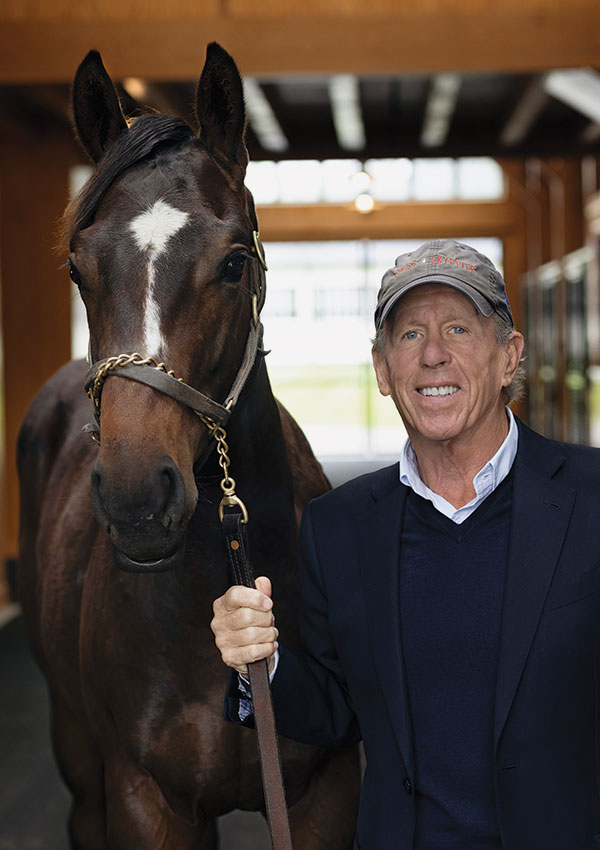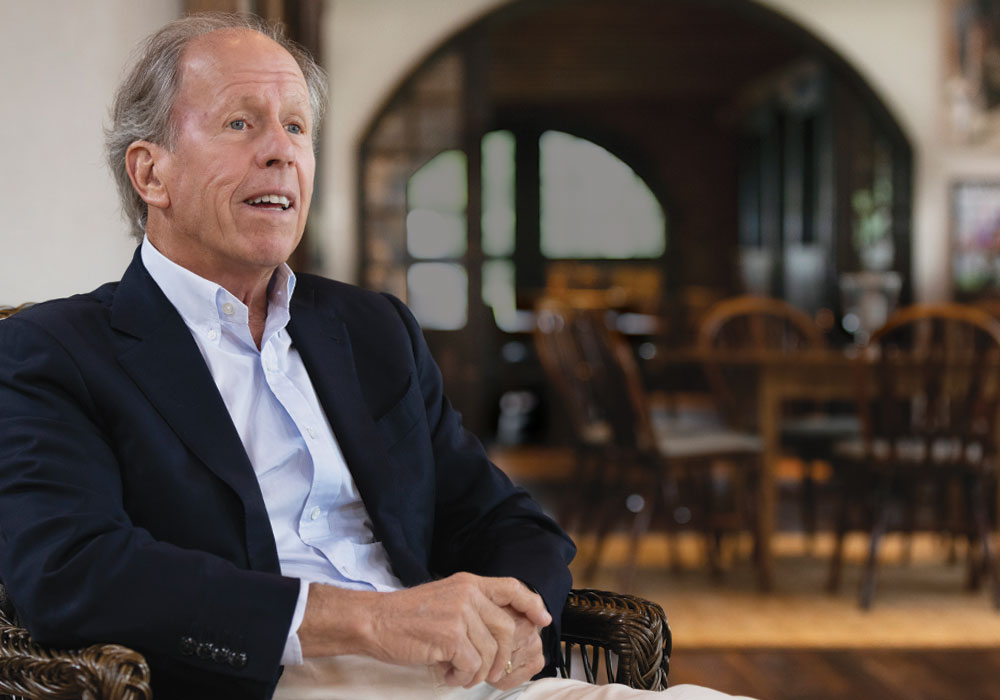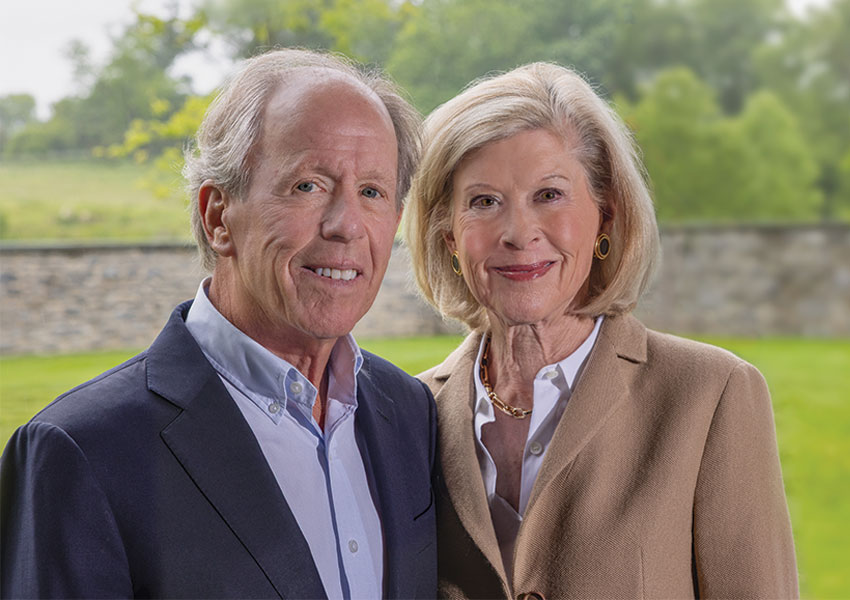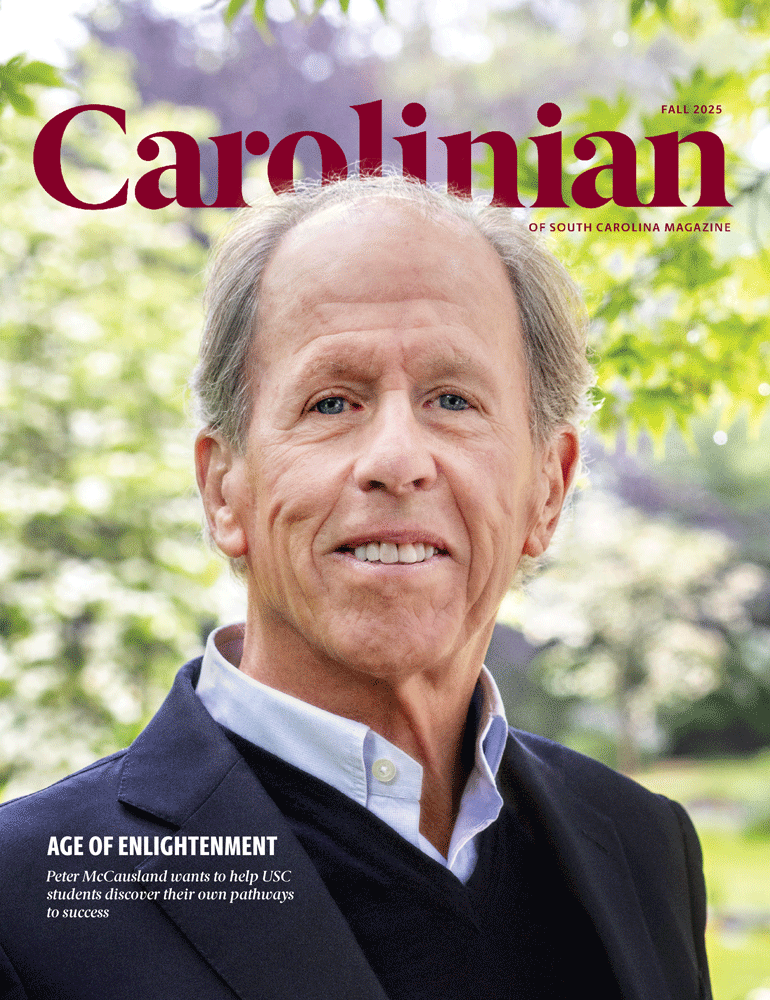If at first you don’t succeed, switch majors. That’s not always the best advice for an undergrad — sometimes you just need to hit the books — but for University of South Carolina alumnus and McCausland College of Arts and Sciences namesake Peter McCausland, ’71, ditching premed was just what the doctor ordered.
During the fall semester of his sophomore year, the Philadelphia native withdrew from half his classes and earned just nine credits. His GPA for the term was a head-scratching 1.3. The next semester, after changing his major to history, McCausland took eight courses — a whopping 24 credits — and finished with a 4.0.
There were a few reasons why Plan A wasn’t working, but it really boiled down to one class: organic chemistry. When it came to molecular formulas and reaction equations, he just wasn’t feeling it.
That may sound funny if you know anything about McCausland’s career. Between 1982 and 2016, the founder of Airgas made a fortune distilling oxygen, nitrogen, argon and other gases for a range of industries. You’ve seen the canisters in hospitals and manufacturing facilities. You’ve seen the tanker trucks on the interstate. In 2016, Airgas sold to French gas company Air Liquide — for $13.4 billion.
Chemistry, in other words, has been good to McCausland. And he enjoys it. He just didn’t enjoy it at 18, sitting at the back of a LeConte College classroom, struggling even to struggle.
“Organic chemistry felt like a duty, like having to clean up your room or something,” he says. “Whereas I had a tremendous appetite to learn about history and to take all the other courses that a liberal arts education offers.”

As part of their efforts to revive the equine program at Erdenheim, the McCauslands have built or restored several facilities, including a yearling barn that opened in 2020. Pem, seen here with Peter McCausland, is one of several thoroughbreds at the historic farm.
We’re sitting in the Mares Barn, one of several historic structures on the grounds of Erdenheim Farm, just outside Philadelphia. Peter and Bonnie McCausland purchased the idyllic 475-acre property in 2009 to stave off real estate developers. They continue to invest in the farm’s rehabilitation so that it might be enjoyed by future generations. To date, they have renovated 52 of the 53 structures on-site and have applied to have the farm, which predates the American Revolution, listed as a historic district.
“We agreed to buy this farm because it was going to be developed into something like 400 houses,” says Peter McCausland. “It wasn’t protected. There was a piece that was protected, 150 of the 475 acres, but most of it was not. It would have been a disaster. When the realtor started printing brochures to sell Erdenheim, we got serious.”
Sixteen years later, the place is worthy of the coffee table book laid out between us. Despite being a mere half-hour drive from downtown Philly, Erdenheim is now a sustainable farm, home to Cheviot and Dorper sheep, Sicilian donkeys, rare Arapawa goats and several breeds of cattle. There’s an apiary, a formal garden and a farm stand that sells produce and eggs to the community.
And then there are the restored horse barns, the newly constructed indoor horse arena, the thoroughbreds and other horses grazing in the grass. The farm’s revived equine breeding program harks back to the 1860s and represents the pastoral carrefour of Peter McCausland’s interest in history, horses, conservation and preservation.
“We never thought we would bring thoroughbreds back to the farm, which is the real history here,” says McCausland. “We took on the responsibility of preserving Erdenheim, but I guess we went a little overboard by bringing the actual horses back.”
Responsibility. It’s a recurring a theme in McCausland’s life. Pulling a 4.0 after nearly flunking out of USC wasn’t just about redeeming his GPA. It was a responsibility — to his father, to himself, to his potential. That same sense of responsibility drove him through law school at Boston University and into his first career, as a lawyer. It also shaped his business ethos at Airgas.
Witness the most defining episode of his career. When rival company Air Products launched a hostile takeover bid in 2009 — just a month after Peter and Bonnie closed on Erdenheim — Peter McCausland refused to fold, even at a profit. Again, he felt a responsibility: this time to Airgas’ shareholders, its customers, its 17,000 employees.
“I was going to be fine financially, regardless of what happened,” he says. “A lot of people said to me at the time, ‘Peter, this is X premium.’ But I just said, ‘It’s not right,’ you know? We were just a much better company with great potential. And it would have been terrible for our employees.”
Airgas was more than a business to McCausland. It was a way of doing business. It was a symbol of his own hard work, and its growth reflected a mentality that had served him since college.
“Winning in that business was more about getting on base than it was about trying to hit home runs, and that appealed to me,” he explains. “You get a small customer, and then another small customer, and another. I just like that. Building something. I always liked building things, even when I was a child.”
He also protects what he builds. Fighting off Air Products’ takeover bid took three years, much of it in court. “It was unbelievable. I’d never been so challenged in my life,” he says. “I’d be on the phone till midnight with the lawyers.”
In the end, McCausland prevailed. The 2011 ruling that upheld Airgas’ shareholder rights, or “poison pill,” tactic for fending off the takeover is now studied in law schools. McCausland still hated to sell the company, but when he finally did, the deal was more favorable.
In 2016, France’s Air Liquide bought Airgas for $143 a share, twice what it would have commanded had he surrendered seven years earlier.
“It’s still called Airgas, but underneath ‘Airgas’ it says, ‘an Air Liquide company,’ which is perfectly fine since they paid $13 billion,” he says. “But the point is that our employees did such a good job and created such a good brand — you know, a trustworthy supplier, fair — that Air Liquide saw the value of that brand and kept it.”
And those 17,000 employees got a fair shake, according to McCausland. “Only three employees at Airgas lost their jobs,” he says, “and one was retiring anyway.”
Erdenheim means “earthly home” in German. More loosely, it means “sanctuary.” “And I’d say it is a sanctuary for us now. It was aptly named,” McCausland says. “Bonnie and I have a lot of fun walking around the farm. We have a pair of bald eagles that have lived on this farm for 11 years.”
But Erdenheim also means something else. In addition to the livestock and thoroughbreds, the farm stand and bucolic meadows, the property is the headquarters of the McCausland Foundation, which supports a range of causes and endeavors, including USC.
The $75 million gift to USC’s College of Arts and Sciences announced this spring was a gift from the McCausland Foundation. Same goes for previous gifts establishing the college’s McCausland Faculty Fellowship, the McCausland Student Innovation Fund, the McCausland Career Readiness and Student Internship Initiative Fund and the McCausland Center for Brain Imaging.
“With everything we do, we try to make sure that the charities and programs we support are good stewards,” says McCausland. “And the University of South Carolina has just been an amazing steward of all the funds that we’ve given over the years.”
“What I remember most about my college days is my professors. Having really dedicated professors who also understand that their job is to inspire students is important. At the University of South Carolina there were just a lot of professors that inspired me.”
The latest gift will build on efforts the foundation has supported previously. Among other things, it will support research initiatives in neuroscience, establish an endowed chair in civic engagement and help students in the college explore career paths, financing up to 150 paid student internships each year.
It will likewise help the college hire and retain faculty, something McCausland sees as critical to the university’s mission.
“What I remember most about my college days is my professors,” he says. “Having really dedicated professors who also understand that their job is to inspire students is important. At the University of South Carolina there were just a lot of professors that inspired me.”
More broadly, he praises the liberal arts curriculum. After switching his major to history, McCausland took courses in English literature and German language, sociology and psychology, art history and political science. Exploring so many disciplines at once shaped him as a critical thinker, he says, and that set him up for success.
“I spent 12 years as a lawyer, and then the entire rest of my career was as a businessman,” he says. “And I’ve never taken a business course in my life.”
Maybe he should have been a history major from the get-go. He is thinking out loud now. As a kid, he devoured the Landmark Books history series. He was fascinated by the Founding Fathers, particularly Alexander Hamilton. In college, it was European history, particularly the Enlightenment.
The focus may shift, but the interest is constant. The bookshelves at Erdenheim are stacked with volumes on history, and McCausland continues to reach for them. Studying the past has prepared him to make decisions in the present.
“You’re studying people from the past, people in particular situations, and how they
reacted to those situations,” he explains. “That comes into play when you have your
own experiences, whether it’s raising a family, or building a house, or running a
company. Of all the liberal arts, history provided the most benefit
in my career.”


